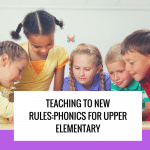 For some of us, spelling comes easily. For others, like me, it is wildly apparent that English is derived from a confusing array or sources. While most good spellers are good readers, not all good readers are good spellers. Still, kids need to be held accountable for their spelling.
For some of us, spelling comes easily. For others, like me, it is wildly apparent that English is derived from a confusing array or sources. While most good spellers are good readers, not all good readers are good spellers. Still, kids need to be held accountable for their spelling.
Every fall parents ask about spelling: spelling test, spelling homework, and spelling in their child’s writing. Spelling is a measure frequently used to determine whether a child is literate. Parents stress over whether the words are too easy or when will their darling stop using phonetic spelling in their writing. Should parents correct little Suzy’s spelling in her homework? The questions are endless for something that has necessary value, but it is hardly the most important skill the child will learn. Spelling rules are complicated and as I said before not indicative of being a strong reader. I always struggle with this crazy emphasis on spelling.
In a class of 25 or so students, spelling ability varies tremendously. In my second grade class, I had the range of kids who could spell anything to children who got 100 on their test but couldn’t read the words on Monday. Some never got more than a couple of words right. Then there was this intelligent girl who always had her nose in a novel and wrote pages in her journal every day. She was an abysmal speller. Even basic sight words, such as “come” or “then” were misspelled.
I straight out refused to use the spelling unit from the basal. In Week 6, one of the second grade words was “convenience.” Besides the fact that the words were ridiculous, too hard for most of my kids to read nonetheless spell, the program had no rhyme or reason to the sequence and lessons. Fortunately, I worked at a school that allowed our grade level to look for other resources.
For many years our grade level used a phonics program-based list. Eventually, the whole school began using the book, Words Their Way: Word Study for Phonics, Vocabulary and Spelling Instruction by Bear, Invernizze, Templeton, and Johnston. After a pre-assessment in the fall, we used the outcome of the test we determined where a speller fell in ability. I found this program very successful for my students.
Usually, we ended up with two groups. In second grade that was often a group still working on short vowels and sight words. The other group frequently fell in the doubling constants when adding suffixes as their short and long vowel spelling was secure.
Whatever program you use, it should be teaching a set skill weekly. There should be a progression of lessons that build on prior skills. It should revisit prior skills regularly.
Here are some ways you can help all spellers be more successful.
1. Do word sorts The word sort technique needs to be taught in class before assigning them as homework. Children sort words by a variety of rules. I could be short or long vowel sounds, parts of speech, or those relating to a specific topic. “Words Their Way” has numerous suggestions. My class loved doing these. The goal is to accuracy and speed. If they do it quickly, they have the concept you are teaching. Check out this Words Your Way link for simple sorts. Also this Pinterest link shows the numerous creative ways teachers use this skill.
2. Homework choice I gave my class the choice of what spelling assignment to do for homework. The goal of this homework was to have engaged learning around the words. The only required bit was at least once during the week, they had to write each word five times each. They had their choice of paper and writing implement. While this sounds odd, many children who have a hard time remembering words a better physical memory was created with the use of crayons or writing a the rough surface of construction paper. (Isn’t a physical memory the whole point of “five times each?”?) Here is a copy of my leeann meredith bingo spelling homework
3. Keep the list should be short More is not better with spelling lists. No more than 10 words or if you must 12. The goal is for them to master the skill. If they understand the spelling concept they can apply it to other words. You can even add a word or two not on the list to the spelling test to see if they have reached mastery. For example, if your group is learning /tion/, add the words “action” or “direction” to the end of weekly assessment. Remember when grading that you are looking to see that they added the /tion/ not whether they can spell “direct” correctly.
4. No more than five times each The habit of teachers is to make those repetitive tasks too long. After five times, kids get bored. Watch them do a list of ten times each. Bored! They come up with all sorts of sneaky ways around it. If you are really married to having them write the words that many times, give them the task of five times each twice a week.
5. Ditch the dictionary Definitions are not spelling unless you are looking for the etymology of a word. As a poor speller, I struggled with the idea of looking up a work to spell it. How can you find “chaos” if you don’t know it begins with /ch/? Dictionaries are also passé’. Everything is on the internet. If you want to see if they know the word have them draw it, use it in a sentence, or write their own definition.
6. Consider assigning private words I love doing this and my grade level team thought I was nuts. I kept track of what was misspelled in general writing and assigned those words to the person who had made the mistake. The young lady who couldn’t spell “come” or “they” had those words assigned until I saw see was spelling them correctly in her writing. There is an upcoming article on this topic.
7. Keep it relevant If you are studying whales and the spelling list includes doubling constants then make sure “blubber” and “swimming” is on your list.
8. Have fun Act out the “evil” e or find tongue twisters or jokes using your spelling list. Spelling bees are fun for good spellers but a nightmare for those who struggle with spelling, have speech issues, or just plain shy. Instead, let the class play spelling games in small groups. Or… well, you tell me what game you like to use to teach spelling.[/fusion_builder_column][/fusion_builder_row][/fusion_builder_container]





